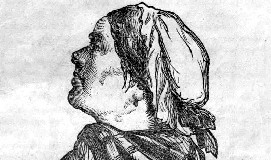|
Life, Crimes, and Confession of Bridget Durgan
On August 30, 1867 an Irish domestic named Bridget Durgan was
hanged in the New Brunswick, New Jersey jail yard for the murder
of Mrs. Mary Ellen Coriel. Soon after the execution, one of her
spiritual advisors published a 30-plus page account of the crime
with a confession section that was allegedly dictated by Bridget
herself.
If Bridget Durgan actually wrote the confession,
her reason for murdering Mrs. Coriel was revenge for a lifetime
of abuse and injustice. She claimed to have been born to
respectable parents in County Sligo, Ireland, in 1843, but 'went
wrong' when an employer's son seduced her. After being paid to
leave the area, she sailed to New York and found work as a
housekeeper. Her mistress ordered her out of the house when a
tryst with an unnamed gentleman left her pregnant. "From that
moment, I began to hate everybody," Bridget wrote, "but most of
all mistresses, and I resolved to kill someone if only the
chance came my way."
After giving birth in a charity hospital, the bitter young woman
worked for a few months in a slum brothel. One night the police
raided the resort, but Bridget evaded arrest by vaulting over a
fence. She fled to Brooklyn and went back into domestic service,
but it proved to be almost as bad a decision as selling her body:
she and her employer, a Mrs. Horning, soon hated each other.
Finally Mrs. Horning called her "a devilish infernal slut" and
fired her. Only the presence of the woman's husband prevented
Bridget from stabbing her on the spot. The furious maid was
determined to kill her former employer though, sending her
poisoned cakes and skulking outside the house with a knife. She
only gave up after Mrs. Horning died of natural causes.
Her plan thwarted, Bridget went to Newmarket, New Jersey, where
she found a position in the house of Dr. and Mrs. Coriel.
Eventually, she wrote, "it came into my head that if Mrs. Coriel
were only out of the way, that I would have a very good place with
the Doctor, as he would no doubt still keep house and have me take
care of it and Mamey (the Coriels' baby) who was fond of me. This
brought Mrs. Horning into my mind, and instantly, like a flash of
lightning, I felt impelled to kill Mrs. Coreil."
So she did. On the night of February 26, 1867, while the doctor
was out, Bridget stabbed and clubbed her mistress to death. (She
wrote that she allowed the bloody, dying woman to kiss her baby
one last time before finishing her off.) After setting the house
on fire, she grabbed the child and fled to a neighbor's home,
where she wailed that robbers had killed Mrs. Coreil. Her wild
behaviour and speech aroused suspicion. So did the fact that the
house bore no visible signs of a break-in.
Bridget Durgan was arrested and charged with the murder of her
employer. A jury found her guilty and the judge sentenced her to
hang, but she seemed unperturbed and defiant until her final night
on earth. Perhaps she had been convinced that she would obtain a
last-minute reprieve on account of her gender. When that didn't
happen, she wrote a confession that she instructed the Reverend
Brendan to publish after her death.
The Life and Crimes of Bridget Durgan was published after
chapbooks of this type stopped being extended sermons, so it is an
interesting and readable account of a forgotten case. Equally
fascinating is how the prose and illustrations reflect the
public's reaction to Bridget herself. She broke almost every
social taboo in existance at the time: she was an Irish servant
who killed a doctor's wife to satisfy a bloodlust and further
entrench herself in the doctor's household. In consequence, the
pen and ink drawings in the book depict her as a husky she-demon
with wild hair and troll-like features. When she murdered an
American lady of a superior class, she relinquished her rights to
any leniency that the courts showed to female defendants during
this period. She was no longer a woman, but a vicious monster
whose destruction was necessary to protect American households.
RoseKeefe.blogspot.com |

